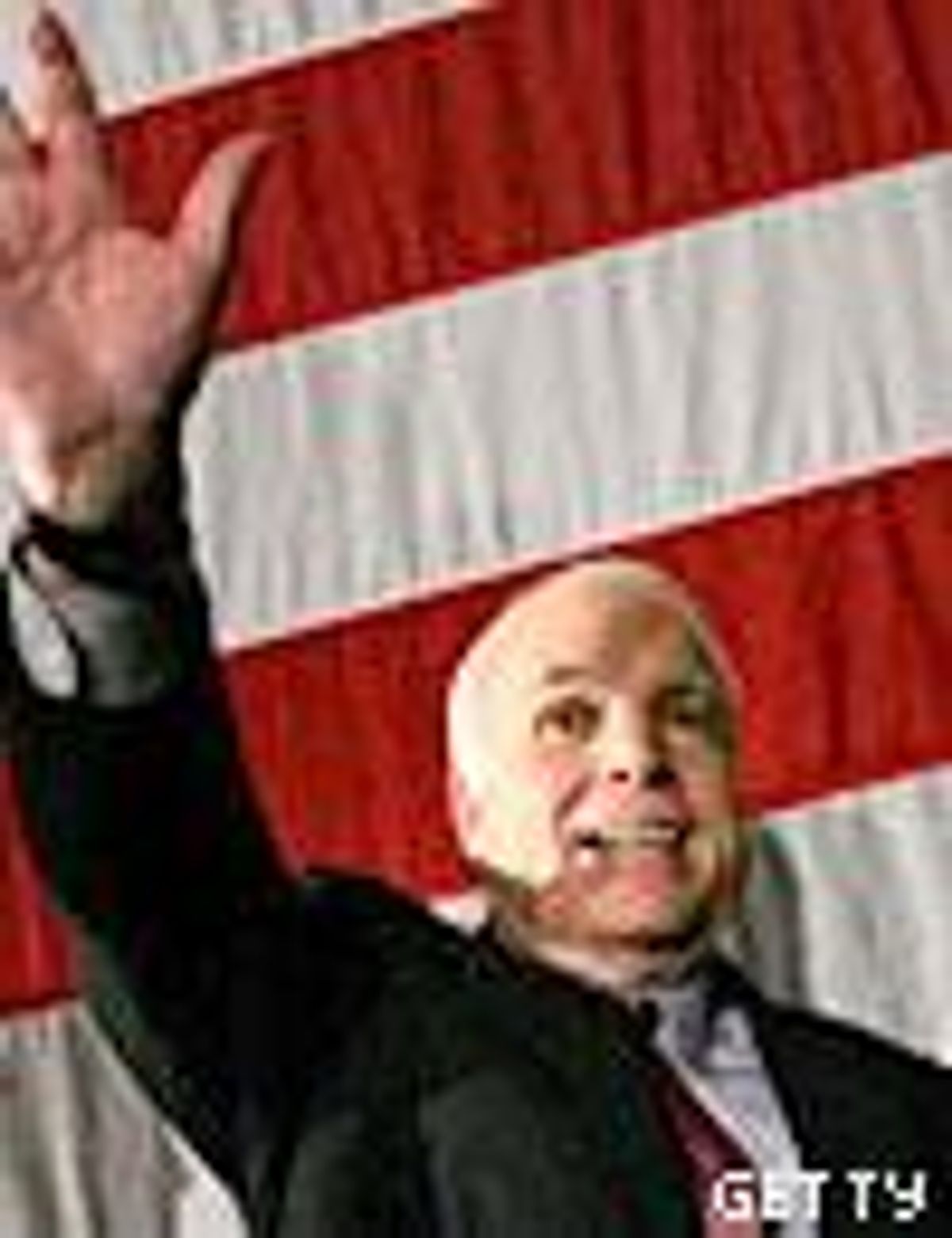Sen. John McCain
aggravates more people in Washington than perhaps any
other politician. Championing reform for campaign finance
and immigration alongside Russ Feingold and Ted
Kennedy has long made McCain a thorn in the side of
conservatives. His steadfast support for the Iraq war
alienates liberals who admire McCain for the reasons
conservatives despise him. And McCain has disappointed
gays.
But while McCain
has racked up an unimpressive voting record in
Congress--he supports "don't ask,
don't tell" and DOMA, and opposes adding
sexual orientation to the federal hate-crimes bill and
ENDA--what distinguishes him from many of his
Republican colleagues is that he has also taken some
courageous stands.
McCain was one of
the very few outspoken Republican opponents of the
Federal Marriage Amendment in the Senate, calling the
proposed ban "un-Republican." This was a
crucial initiative for the religious right, endorsed
by President Bush and used as a wedge issue in the 2004
presidential campaign. McCain spent far more political
capital in standing against this divisive amendment
than Hillary Clinton, Barack Obama, or, for that
matter, any Democrat. The Human Rights Campaign
praised his "ironclad opposition to undermining the
Constitution" and said that "all
senators should follow Senator McCain's
example."
McCain's
opposition to the FMA is emblematic of his tempestuous
relationship with the religious right. After the bruising
2000 Republican presidential primary in South
Carolina, McCain labeled the reverends Jerry Falwell
and Pat Robertson "agents of intolerance" and
"corrupting influences on religion and
politics." Sure, McCain spoke at Falwell's
Liberty University in 2006, but he didn't pander. At
the end of the day, McCain loathes the religious
right, and the feeling is mutual. A notoriously
stubborn man, he will probably not feel the need to appease
the antigay wing of his party, especially considering how
outspoken its members have been in their denunciation
of him. Evangelical leader James Dobson has already
said he will not support McCain.
As if to
neutralize his outspoken opposition to the FMA -- and to
frustrate those gays who might otherwise support him
enthusiastically -- McCain backed a proposed 2006
amendment to the Arizona constitution that would have
not only prevented gay marriage but denied government
benefits to unmarried couples. While McCain's
support for this measure is regrettable, ultimately,
what a senator or president thinks about a state-level
constitutional amendment is less relevant than where he
stands on a federal one. Let's not forget that John
Kerry, while running for president in 2004, supported
a reversal of the 2003 Massachusetts supreme court
decision mandating gay marriage, a move that would have
stripped civil rights from gays, not merely
denied them.
Alongside
McCain's mixed political record are frequent
instances of his positive attitude toward gay people.
During the 2000 Republican presidential primary
season, he said that he was "unashamed,
unembarrassed, and proud to work with" the Log Cabin
Republicans. That same year, when then-Tempe,
Ariz., mayor Neil Giuliano revealed his homosexuality
to preempt threats to out him, "John was the first to
tell the religious right, 'This doesn't
make a damned bit of difference,' "
Giuliano later told The Boston Globe. And days
after September 11, 2001, he went to Berkeley, Calif., to
deliver a heartfelt eulogy in honor of Mark Bingham,
the gay hero of United Flight 93 who supported his
presidential campaign in 2000.
A McCain
presidency would transform the GOP for the better.
Republicans chose a man who is driven by a temperament
that inhibits him from resorting to the crass gay
baiting of his peers. In January, when McCain
discovered that his campaign was using robocalls to attack
Mitt Romney's past support of "special
rights" for gays, he stopped them.
Some gays will
ask why they should support McCain over presumptive
Democratic nominee Obama, who -- at least in his rhetoric --
promises to do more for gay rights. To be sure, McCain
will not win over single-issue gay voters. But if
you're concerned about Obama's foreign policy
naivete or his proclivity for raising taxes,
give McCain a serious look. Obama's pleasant
speechifying about gay rights is belied by his thin
legislative record, and it didn't stop him from
parading around the hateful "ex-gay"
preacher Donnie McClurkin to win black votes in South
Carolina.
In a 1999
interview McCain said he'd be
"comfortable" with a gay president. This
gay writer would be more than comfortable with John
McCain in the Oval Office


















































































